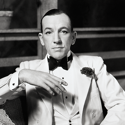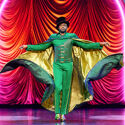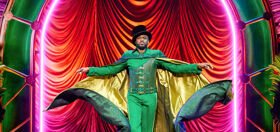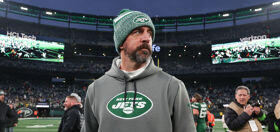
In 1995, the U.S. Supreme Court unanimously voted to allow Boston’s St. Patrick’s Day Parade organizers to ban gay groups from marching. It’s allowed the Allied War Veterans of South Boston’s parade guru John “Wacko” Hurley to keep homos out. But an official ruling from the nation’s top court doesn’t make the decision for public figures on whether to join the parade any easier. Should Mayor Thomas M. Menino show up to show his support for Boston’s large Irish community? Or should he stay home, to quietly show support for the gay men and women being discriminated against?
During his mayoral tenure, Menino has found a delicious compromise: “Menino participates each year in the breakfast on the morning of the parade, often does media interviews at the head of the parade for television coverage of the event, and visits South Boston residents’ homes during the parade,” reports the Boston Globe. “But as a symbol of his opposition to what he considers the organizers’ discriminatory policy, he has consistently refused to march along the route.”
And he appears to have some support:
Kristie Helms, a member of the board of directors of Boston Pride, which puts on an annual parade in the city for gay rights and awareness, said politicians and the other candidates should follow Menino’s lead.
“It’s disappointing to us that any mayoral candidate is participating in a parade that discriminates against the gay community,” Helms said. “Mayor Menino’s set a pretty high example that all the mayoral candidates are going to have to strive for.”
But what about elected officials not addressed as “Mr. Mayor”?
How about we take this to the next level?
Our newsletter is like a refreshing cocktail (or mocktail) of LGBTQ+ entertainment and pop culture, served up with a side of eye-candy.
Challengers Sam Yoon and Michael F. Flaherty, city councilors who are loath to turn their backs on a high-profile community event in a voter-rich section of the city, say they will march, but insist that does not mean they endorse the prohibition on gay groups’ participation. A third challenger, South End businessman Kevin McCrea, will sit it out.
[…] But Yoon and Flaherty say it is an easier choice for Menino.
“It doesn’t cost him anything politically not to march,” Yoon said, pointing out other high- profile events during the day in which Menino is a key participant. “I’ve suffered consequences for telling Wacko Hurley exactly how I feel about his position on this issue.”
Yoon said that he was given a spot at the back of the parade lineup last year after he sent Hurley a letter urging him to change the policy. “I was a little bit after the horses that pooped in front of me,” said Yoon, an at-large councilor.
Still, he said the parade is important to South Boston. “I don’t think it’s fair to punish the people of South Boston because of Wacko Hurley’s stance.”
Flaherty, who lives in South Boston, said he has participated in the parade for the last 39 years and would not change that as a mayoral candidate. “The parade doesn’t define me or my consistent record and support of the [gay] community,” Flaherty said. “I march in all the parades. You name it, I march in it.”
Even a white power march, Mr. Flaherty?




















Jonathan
No. It’s not okay to march in it. Ok? Is that clear enough?
Same way you wouldn’t eat at or golf (if you do that) at a NJA or NBA country club.
Alan down in Florida
Why don’t they just hold the Pride parade on St. Patty’s day? That’d force his hand.
Alex
We should be celebrating Bayard Rustin day on March 17th. Render unto the homophobes that which is homophobic.
Tom in COS
Ahhh Southie, home of intolerence in Boston, how i don’t really miss you.
jake
Wow – this is awful. I can’t believe I spent my youth vocalizing social equality for black people to grow up to fight for my own social equality. I was born way too early.
kevin (not that one)
Seriously, why would anyone want to be a part of one of these parades. They’re not indicative of all Irish people or Irish Americans and that’s the way the parade organizers want it. It’s a bigot march.
CitizenGeek
It’s ridiculous that the two largest St. Patrick’s Day parades (in Boston and New York) ban gays from marching. It’s all to do with the Catholic church’s influence in the planning of the parades, I’d imagine. I’m Irish and I’ve lived here, in Ireland, for my whole life, and not a single parade (in the main cities; Dublin, Cork, Belfast, Galway, Limerick and Kilkenny, or in any town or village) bans gays from marching. This despicable cowardice on behalf on the organisers does is antithesis to Ireland and the Irish.
DaveO
The St. Patrick’s day parades do not ban gays, per se, but they do ban groups with a gay message. Not the same thing.
RichardR
@DaveO: So, DaveO, closeted gays are allowed to march? Well that’s okay, then!
lambman
I am gay, but I don’t think gay groups have a right to be in this parade. Saint Patricks day is a catholic holiday…personally I don’t believe in catholicism but I do support the rights of religious groups to make this type of choice….even if they make the wrong choice
I agree the MAYOR however should never align himself with biggots
Sue O'Connell
How about linking to our story and editorial from yesterday instead of the Globe’s re-hash from today?
Sue O'Connell
[img]http://www.baywindows.com[/img]
kevin (not that one)
@lambman: St. Pats Day is as much of a Catholic holiday as Mardi Gras is, except with more shit-faced drunks. SPD where I live is about dressing in stupid green hats, drinking green beer, and passing out by 12PM…what does this have to do with the Church? We have a parade filled with Irish step dancers (hello, Riverdance?), old fat pasty white people on floats, the local Sinn Fein Catholic Nationalists, and lots of Dan Whites expressing their traditional values to beat up freaks…so as a gay man, I’m sort of glad none of us are a part of it.
Thomas
These are the same jerks who support the IRA. Fuck them and their parade.
Mark in Colorado
So I take it that if you support the idea that gays should be allowed to march in this parade, then you also would have no problem with letting an ex-gay contigency march in a gay pride parade?
We don’t all have to get along. Civility doesn’t require us to like each other.
Freedom of association is a critical important constitutional principle.
This gay man does not support forcing someone who dislikes, disapproves, or hates me to then let me join their group, organization, or parade. I sure as hell wouldn’t want them in my group, organization, or parade.
DaveO
@RichardR: No, a person who is openly gay is allowed to march.
alan brickman
If they are still making it a straight experinence i say Just show up and see what happens…but keep it tasteful…there are children present remember..
Phoenix (A Happy Gay Shamrock At The End Of The Rainbow, Bitches)
In 2000 when they banned teh gays from marching in NY’s Saint Paddy’s parade they chanted “We march in Dublin, we march in Cork, why can’t gays march in New York?”
http://www.workers.org/ww/2000/ilgo0330.php
thatguyfromboston
@sue – Yay, I was going to post the link to the story, but you got here first.
Robert, NYC
Now how about billing the parade for extra cops that have to patrol this parade….a religious celebration of St. Patrick?Since when do taxpayer dollars subsidize religion or a religious ideology, in this case the catholic cult? Better yet, lets go after and pursue removal of tax-exempt status of all cults that meddle in the political process and advocate for and influence its cultist followers to vote against equality and support discrimination against us? Why should our tax dollars pay for their exemptions and privileges when many of us aren’t even religious or nonbelievers?
Kevin (not that one)
@Robert, NYC: I agree with you. However, “cult” is the wrong word to use here. Your points are all good, but you lose the argument when you throw the word “cult” around. Unfortunately, bad rhetoric can kill perfect logic.
Robert, NYC
@Kevin (not that one):
Kevin, the reason I use the word “cult” for mostly all religious denominations is that when you have a leader of any religion dictating to its adherents what it should or must believe in and how to think in order to be a member, then to me that is tantamount to cultism. For example, if a catholic refuses to accept the doctrine of the assumption of the virgin mary, the immaculate conception, that the consecrated host and wine are the body and blood of jesus (trans-substantiation), then he or she is guilty of heresy, one of the nine categories that call for excommunication. In other words, believers are not allowed to challenge doctrine or beliefs but must submit to papal authority or else face the obvious. Circumcision or a better term for it…genital mutilation in abrahamic religions is also a form of cultism and a prerequisite for membership, primitive at best.
Kevin (not that one)
@Robert, NYC: Robert, you may be right. And using the standard definition, many things fall underneath the umbrella of “cult”. For example, it could certainly be said that the Dalai Lama is a cult leader. Steve Jobs is a cult leader. And Barack Obama is a cult leader.
I just don’t think “cult” is a very nice word to use when you disagree with someone because it immediately says that some people’s beliefs are less legitimate than others. And that’s divisive. I’m not a Catholic and frankly, I find Catholic dogma to be very unappealing personally. I have every right to call the Catholic religion a cult of the Pope, but that’s just not how I choose to talk to people who are Catholic.
I’m like you and are just as guilty of using inflammatory rhetoric when I get pissed. But I think, in the end, logic and de-escalation of verbal attacks is how we will win this struggle. Take the high road, because lord knows all of the attacks on us have never originated from a high moral standard.
Robert, NYC
Kevin, I take your point but when they bash us, then I use “cult” to piss them off. Quite honestly though, I do believe they are cults, most of them brainwashed at that. Its all learned behavior, nobody comes into this world religious and nobody is born religious unlike our orientation. They choose to live that way, therefore, theirs is a lifestyle, ours is not as they’re so intent on calling it as such. They know that pisses us off too. Taking the high road is all fine and well, but it hasn’t done much to advance our rights. I believe in holding our elected officials collective feet to the fire, either deliver or don’t take our votes for granted come 2010 and 2012 respectively. I’m tired of waiting and being politically correct by not offending them and I’m also sick of their delay tactics and excuses. Its time to demand our rights or else.
Charles J. Mueller
I have zero “0” tolerance for hatred.
Zip. Nada. Zilch.
Why would any self-respecting LGBT person even want to march in that bigoted mess?
Robert, NYC
@Charles J. Mueller:
Charles, I wouldn’t either. If the St. Patrick’s day parade excludes LGBT people from marching because its a “religious” celebration as some claim, then if that’s the case, the parade organizers should compensate their local city governments for the hundreds of police that line the parade routes at taxpayer expense, including yours and mine. Here in New York City, the Ancient Order of Hibernians who run the parade have always claimed its a catholic celebration of Irish Heritage and also a religious parade in honor of St. Patrick. Sounds like an open and shut case to me, make them pay for it out of their own pockets, not us the taxpayers. You can bet they’d deny its a religious celebration to avoid paying back what they owe.
Charles J. Mueller
@Robert, NYC:
Amen, brother. 😉
Mtt
I have been marching in the NYC St. Patrick’s day parade since I can remember (and I am old). The parade does not let groups identified as homosexual march under their own banner. I know of hundreds of gay and lesbian marchers in this parade. We want to be accepted into life, no?
Robert, NYC
@Mtt:
Mtt, how can any gay person be “accepted into life”, whatever you mean by that? Does that mean that you’re in the closet and people don’t really know who you are? If that’s the case, how can “accepted into life” mean anything if people have no idea who you are? That’s the problem with straight society, they really don’t know who we are. To remain invisible gets us nowhere, but only allows homophobia to propogate and it will always be that way if we remain in the closet which is what many of them want us to do so that they don’t have to deal with equality, especially marriage equality. They wish we’d all go away and disappear. Remaining invisible will do just that as far as our rights are concerned. How is it that LGBT people can march in Dublin under their own banner? Everybody else has a banner, why not us? Are people so ashamed of who they are?
Ryan
Lambman,
St. Patrick’s Day is not a Catholic holiday. It’s an excuse to get drunk and have corn beef and cabbage. Examples of Catholic high holidays would be Easter and Christmas. Not only do you not have to attend mass on St. Patty’s Day, I’m not sure if (at least outside of Irish neighborhoods) there is even a special mass.
Moreover, what does it matter? They’re using public streets. They should have the decency to allow proud, out and probably Irish gays to march. The parade is not a religious ceremony. If it were, there’s religious land they could be having this ceremony on.
siobhan
@Jonathan:
I’m Irish and I can’t believe that gay people can’t rock with the rest of us on St. Patricks Day. These “IRISH” people have kept the same backward mentality that was around when they left the emerald Isle 100 years ago. Well wake up homophobes, Ireland has developed and grown and gay people are valued and respected in our society… Why don’t the organisers just go ahead and join up with the crazy ass Phelps Cult, move to their ranch and leave the rest of us to get on with the party… It’s hard to believe it’s actually 2009…
Robert, NYC
@RichardR:
Its similar to DADT, we’re told by our government to lie about who we are. Nice piece of morality in that coming from the RC cult,one of the most immoral of all.